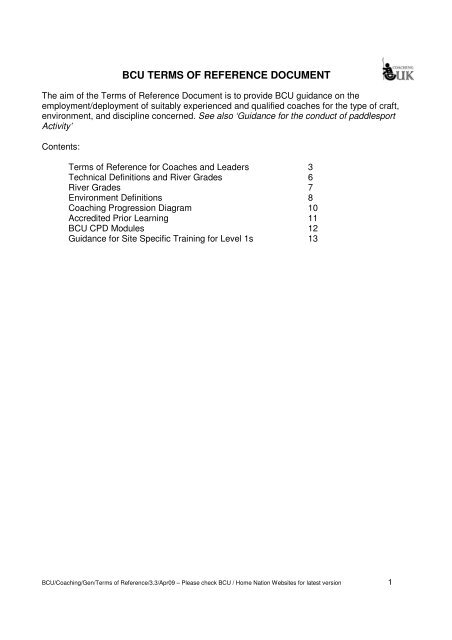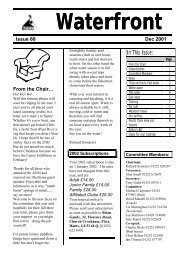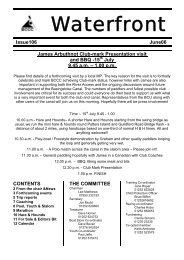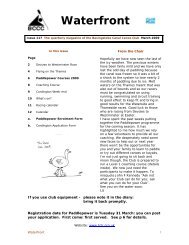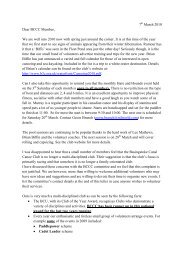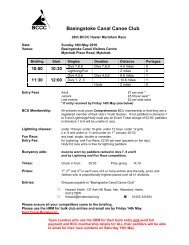BCU TERMS OF REFERENCE DOCUMENT - Canoe England
BCU TERMS OF REFERENCE DOCUMENT - Canoe England
BCU TERMS OF REFERENCE DOCUMENT - Canoe England
Create successful ePaper yourself
Turn your PDF publications into a flip-book with our unique Google optimized e-Paper software.
<strong>BCU</strong> <strong>TERMS</strong> <strong>OF</strong> <strong>REFERENCE</strong> <strong>DOCUMENT</strong><br />
The aim of the Terms of Reference Document is to provide <strong>BCU</strong> guidance on the<br />
employment/deployment of suitably experienced and qualified coaches for the type of craft,<br />
environment, and discipline concerned. See also ‘Guidance for the conduct of paddlesport<br />
Activity’<br />
Contents:<br />
Terms of Reference for Coaches and Leaders 3<br />
Technical Definitions and River Grades 6<br />
River Grades 7<br />
Environment Definitions 8<br />
Coaching Progression Diagram 10<br />
Accredited Prior Learning 11<br />
<strong>BCU</strong> CPD Modules 12<br />
Guidance for Site Specific Training for Level 1s 13<br />
<strong>BCU</strong>/Coaching/Gen/Terms of Reference/3.3/Apr09 – Please check <strong>BCU</strong> / Home Nation Websites for latest version 1
Terms of Reference for Coaches and Leaders<br />
Environment<br />
Former<br />
Coaching<br />
Awards<br />
Very Sheltered and Sheltered Inland Water<br />
New system<br />
(to coach & lead)<br />
Recommended<br />
Ratios for<br />
coaching & leading<br />
New<br />
system<br />
(to lead) 1<br />
Recommended Ratios<br />
for leadership of<br />
competent paddlers<br />
A qualified <strong>BCU</strong> UKCC Level 1 Coach who has not received any additional training must work under direct supervision. In order for them to<br />
work without direct supervision the following additional requirements must be met:<br />
Very Sheltered Water <strong>BCU</strong> Level 1<br />
or<br />
<strong>BCU</strong> Level 2<br />
<strong>BCU</strong> UKCC Level 1 plus:<br />
• Additional training 2<br />
• Valid First Aid<br />
1:8 students<br />
1:6 students in open<br />
canoes paddled solo<br />
N/A N/A<br />
Trainee • CRB (or Home Nation equivalent) 1:12 students when<br />
• Over 18yrs<br />
paddling tandems,<br />
Sheltered Inland Water<br />
<strong>BCU</strong> Level 2 <strong>BCU</strong> UKCC Level 1 plus:<br />
• Site specific training 3<br />
• Valid First Aid<br />
• CRB (or Home Nation<br />
equivalent)<br />
• Over 18yrs<br />
OR <strong>BCU</strong> UKCC Level 2<br />
or crew boats<br />
1:8 students<br />
1:6 students in open<br />
canoes paddled solo<br />
1:12 students when<br />
paddling tandems,<br />
or crew boats<br />
N/A<br />
N/A<br />
1 The 4&5 star leadership awards are not coaching awards. They are not suitable for introducing beginners to the sport<br />
2 Additional Training - In this context the term ‘additional training’ relates to documented site specific training focusing on appropriate site<br />
and activity induction and an active introduction and awareness of local operating procedures. In order for this training to be recognised the<br />
<strong>BCU</strong> would require that the training be delivered by a <strong>BCU</strong> Coach Level 3 (or above) or a Technical Adviser where the Adventure Activities<br />
Licensing Regulations apply. For Centres, endorsement of the suitability of appropriate additional training can be confirmed via<br />
<strong>BCU</strong> Centre Approval.<br />
3 Site Specific Training - In this context the term ‘site specific training’ relates to documented, appropriate site and activity induction and<br />
an active introduction and awareness of local operating procedures. In order for this training to be recognised the <strong>BCU</strong> would require that<br />
the training be delivered by a <strong>BCU</strong> Coach Level 3 (or above) or a Technical Adviser where the Adventure Activities Licensing Regulations<br />
apply. For Centres, endorsement of the suitability of appropriate site specific training can be confirmed via <strong>BCU</strong> Centre Approval.<br />
<strong>BCU</strong>/Coaching/Gen/Terms of Reference/3.3/Apr09 – Please check <strong>BCU</strong> / Home Nation Websites for latest version 2
Environment<br />
Former<br />
Coaching<br />
Awards<br />
New system<br />
(to coach & lead)<br />
Recommended<br />
Ratios for coaching &<br />
leading<br />
New<br />
system<br />
(to lead) 4<br />
Recommended Ratios<br />
for leadership of<br />
competent paddlers<br />
Inland Water - White Water Kayak<br />
Moderate White Water<br />
(grade 2(3) and equivalent<br />
weirs)<br />
Moderate Inland Water<br />
(open water no more than<br />
500m from shore and winds<br />
below force 4)<br />
Advanced White Water<br />
(grade 3 to grade 4(5))<br />
Advanced Inland Water<br />
(open water more than 500m<br />
from shore and/or winds<br />
above force 4)<br />
Inland Water - Open <strong>Canoe</strong><br />
Moderate White Water<br />
(descents up to grade 2, and<br />
equivalent weirs)<br />
Moderate Inland Water (no<br />
more than 500m from shore<br />
and winds below force 4)<br />
Advanced White Water<br />
(grade 3)<br />
Advanced Inland Water<br />
(very large lakes/lochs)<br />
<strong>BCU</strong> Level<br />
3 (Inland)<br />
<strong>BCU</strong> Level<br />
4 (Inland)<br />
<strong>BCU</strong> Level<br />
3 (<strong>Canoe</strong>)<br />
<strong>BCU</strong> Level<br />
4 (<strong>Canoe</strong>)<br />
<strong>BCU</strong> Moderate White<br />
Water Endorsement<br />
Or<br />
<strong>BCU</strong> UKCC Level 3<br />
(White Water)<br />
<strong>BCU</strong> UKCC Level 3 with<br />
<strong>BCU</strong> Advanced White<br />
Water Endorsement<br />
<strong>BCU</strong> Moderate Open<br />
<strong>Canoe</strong> Endorsement<br />
Or<br />
<strong>BCU</strong> UKCC Level 3 (Open<br />
<strong>Canoe</strong>)<br />
<strong>BCU</strong> UKCC Level 3 with<br />
<strong>BCU</strong> Advanced Open<br />
<strong>Canoe</strong> Endorsement<br />
1:6 students <strong>BCU</strong> 4*<br />
Leader<br />
Award<br />
(White<br />
Water)<br />
1:4 students <strong>BCU</strong> 5*<br />
Leader<br />
Award<br />
(White<br />
Water)<br />
1:5 students in open<br />
canoes paddled solo<br />
1:10 students when<br />
paddling tandem<br />
1:4 students<br />
(solo or tandem)<br />
<strong>BCU</strong> 4*<br />
Leader<br />
Award<br />
(<strong>Canoe</strong>)<br />
<strong>BCU</strong> 5*<br />
Leader<br />
Award<br />
(<strong>Canoe</strong>)<br />
1:4 competent<br />
paddlers<br />
1:4 paddlers<br />
1:4 competent<br />
paddlers in open<br />
canoes paddled solo<br />
1:6 competent<br />
paddlers when<br />
paddling tandem<br />
1:4 paddlers<br />
(solo or tandem)<br />
4 The 4&5 star leadership awards are not coaching awards. They are not suitable for introducing beginners to the sport<br />
<strong>BCU</strong>/Coaching/Gen/Terms of Reference/3.3/Apr09 – Please check <strong>BCU</strong> / Home Nation Websites for latest version 3
Environment<br />
Inland Water - Touring Craft<br />
Moderate White Water<br />
(descents up to grade 2, and<br />
equivalent weirs)<br />
Moderate Inland Water (no<br />
more than 500m from shore<br />
and winds below force 4)<br />
Former<br />
Coaching<br />
Awards<br />
<strong>BCU</strong> Level 3<br />
(Placid Water)<br />
New system<br />
(to coach & lead)<br />
<strong>BCU</strong> Moderate Water<br />
Touring Endorsement<br />
OR<br />
<strong>BCU</strong> UKCC Level 3<br />
(Touring<br />
Recommended Ratios<br />
for coaching &<br />
leading<br />
1:6 students<br />
1:5 students in open<br />
canoes paddled solo<br />
1:10 students when<br />
paddling tandem<br />
New<br />
system<br />
(to lead) 5<br />
<strong>BCU</strong> 4*<br />
Leader<br />
Award<br />
(Touring)<br />
Recommended Ratios<br />
for leadership of<br />
competent paddlers<br />
1:6 competent<br />
paddlers<br />
1:4 competent<br />
paddlers in open<br />
canoes paddled solo<br />
1:6 competent<br />
paddlers when<br />
paddling tandem<br />
Advanced White Water<br />
(descents up to grade 3 water<br />
more than 500m from shore<br />
and/or winds above force 4)<br />
Surf 6<br />
Moderate Surf <strong>BCU</strong> Level 3<br />
(surf)<br />
Advanced Surf (>3ft) <strong>BCU</strong> Level 4<br />
(surf)<br />
<strong>BCU</strong> UKCC Level 3 with<br />
<strong>BCU</strong> Advanced Water<br />
Touring Endorsement<br />
<strong>BCU</strong> Moderate Water Surf<br />
Endorsement<br />
OR<br />
<strong>BCU</strong> UKCC Level 3 (Surf)<br />
<strong>BCU</strong> UKCC Level 3 with<br />
<strong>BCU</strong> Advanced Water<br />
Surf Endorsement<br />
1:4 students<br />
(irrespective of the<br />
number of boats)<br />
<strong>BCU</strong> 5*<br />
Leader<br />
Award<br />
(Touring)<br />
1:6 students <strong>BCU</strong> 4*<br />
Leader<br />
Award (Surf)<br />
1:4 students <strong>BCU</strong> 5*<br />
Leader<br />
Award (Surf)<br />
1:4 paddlers<br />
(irrespective of the<br />
number of boats)<br />
1:6 paddlers<br />
1:4 paddlers<br />
5 The 4&5 star leadership awards are not coaching awards. They are not suitable for introducing beginners to the sport<br />
6 Note: Surf qualifications are for repeated manoeuvring through waves on recognised surf beaches; sea qualifications cover access through surf for sea<br />
journeys<br />
<strong>BCU</strong>/Coaching/Gen/Terms of Reference/3.3/Apr09 – Please check <strong>BCU</strong> / Home Nation Websites for latest version 4
Environment<br />
Sea<br />
Sheltered Tidal Water<br />
and Sea<br />
Moderate Tidal<br />
Water/Sea<br />
Former<br />
Coaching<br />
Awards<br />
<strong>BCU</strong> Level 2<br />
<strong>BCU</strong> Level 3<br />
(sea)<br />
New system<br />
(to coach & lead)<br />
<strong>BCU</strong> UKCC Level 1 plus:<br />
• Site specific training**<br />
• Valid First Aid<br />
• CRB (or Home Nation<br />
equivalent)<br />
• Over 18yrs<br />
OR<br />
<strong>BCU</strong> UKCC Level 2<br />
<strong>BCU</strong> Moderate Water Sea<br />
Endorsement<br />
OR<br />
<strong>BCU</strong> UKCC Level 3 (Sea)<br />
Recommended Ratios<br />
for coaching &<br />
leading<br />
1:8 students<br />
1:6 students in open<br />
canoes paddled solo<br />
1:12 students when<br />
paddling tandem<br />
(irrespective of craft)<br />
New<br />
system<br />
(to lead) 7<br />
N/A<br />
1:6 students <strong>BCU</strong> 4*<br />
Leader<br />
Award (Sea)<br />
Recommended Ratios<br />
for leadership of<br />
competent paddlers<br />
N/A<br />
1:4 competent<br />
paddlers<br />
Advanced Tidal<br />
Water/Sea<br />
Swimming Pools<br />
<strong>BCU</strong> Level 4<br />
(sea)<br />
<strong>BCU</strong> UKCC Level 3 with<br />
<strong>BCU</strong> Advanced Water Sea<br />
Endorsement<br />
1:4 students <strong>BCU</strong> 5*<br />
Leader<br />
Award (Sea)<br />
1:4 paddlers<br />
A qualified <strong>BCU</strong> UKCC Level 1 Coach who has not received any additional training must work under direct supervision (this maybe in the<br />
form of a Pool lifeguard, or higher qualified <strong>BCU</strong> Coach). In order for them to work without direct supervision the following additional<br />
requirements must be met:<br />
Swimming Pool <strong>BCU</strong> Level 1<br />
or<br />
<strong>BCU</strong> Level 2<br />
Trainee<br />
<strong>BCU</strong> UKCC Level 1 plus:<br />
• Additional training (see<br />
footnote 2 , page 1)<br />
• Valid First Aid<br />
• CRB (or Home Nation equivalent)<br />
• The person responsible for<br />
the session must be over<br />
18yrs<br />
1:8 students<br />
1:6 students in open<br />
canoes paddled solo<br />
1:12 students when<br />
paddling tandems, or<br />
crew boats<br />
N/A<br />
N/A<br />
7 The 4&5 star leadership awards are not coaching awards. They are not suitable for introducing beginners to the sport<br />
<strong>BCU</strong>/Coaching/Gen/Terms of Reference/3.3/Apr09 – Please check <strong>BCU</strong> / Home Nation Websites for latest version 5
Technical Definitions:<br />
Note Regarding <strong>BCU</strong> UKCC Level 1 and 2 Bank-based Coaches<br />
The <strong>BCU</strong> UKCC Level 1 and 2 Coaching awards can be accessed by both ‘Boat Based’ and<br />
‘Bank Based’ Coaches. Candidates will be assessed as per the chosen route with the<br />
assessment reflecting the required degree of ‘how to coach’ / ‘what to coach’ risk<br />
assessment, safety and rescue. The Bank-based Coach is an award for coaches who will<br />
work from the waters edge. This would be accessed by individuals who do not have the<br />
personal paddling skills to enable them to work from the water. Bank-based coaches have<br />
completed the <strong>BCU</strong> Foundation Safety and Rescue Training, and are equipped to risk assess<br />
an activity to judge if additional on the water safety cover is required. The Boat-based Coach<br />
is an award for individuals with the required degree of personal paddling skills and who intend<br />
to coach from a canoe, kayak or the waters edge.<br />
Note Regarding The Adventure Activity Licensing Regulations 2004<br />
The above regulation state that any “specified waters” fall within the scope of the legislation.<br />
According to these regulations, “specified waters” means—<br />
(a) the sea;<br />
(b) tidal waters;<br />
(c) inland waters at a location where any part of those waters is more than 50 metres from the<br />
nearest land excluding any island; or<br />
(d) inland waters where the surface of the water is made turbulent because of weirs, rapids,<br />
waterfalls or fast flowing currents;<br />
The <strong>BCU</strong> provides differing levels of certification for coaches in these environments as follows<br />
& as listed above in the Terms of Reference:<br />
(a) the sea; Sheltered tidal water & sea, Moderate tidal water & sea, Advanced tidal water &<br />
sea. When repeated manoevering through surf on recognised surf beaches takes place<br />
then Moderate Surf & Advanced Surf Awards are appropriate.<br />
(b) tidal waters; Sheltered tidal water & sea, Moderate tidal water & sea, Advanced tidal water<br />
& sea. When repeated manoevering through surf on recognised surf beaches takes place<br />
then Moderate Surf & Advanced Surf Awards are appropriate.<br />
(c) inland waters at a location where any part of those waters is more than 50 metres from the<br />
nearest land excluding any island; Sheltered Inland Water, Moderate Inland Water &<br />
Advanced Inland Water<br />
(d) inland waters where the surface of the water is made turbulent because of weirs, rapids,<br />
waterfalls or fast flowing currents; Moderate White Water & Advanced White Water<br />
<strong>BCU</strong>/Coaching/Gen/Terms of Reference/3.3/Apr09 – Please check <strong>BCU</strong> / Home Nation Websites for latest version 6
River Grades:<br />
The International river classification of difficulty is used for white water grades (see below),<br />
with brackets used as per many modern guidebooks.<br />
Grade 2 Free passage. Irregular Stream, irregular waves. Medium rapids, small stoppers,<br />
eddies, whirlpools and pressure areas.<br />
Grade 3 Route recognisable. High irregular waves. Larger rapids. Stoppers, eddies,<br />
whirlpools and pressure areas. Isolated boulders, (small) drops and numerous<br />
obstructions in stream.<br />
Grade 4<br />
Grade 5<br />
Route not always recognisable. Heavy continuous rapids. Heavy stoppers,<br />
whirlpools and pressure areas. Boulders obstructing stream, big with undertow.<br />
Inspection essential. Extreme rapids. Stoppers, whirlpools and pressure areas.<br />
Narrow passages, steep gradients and drops with difficult access and landing.<br />
Grade 2(3) The overall standard of the run is grade 2, but there may be a few (normally one<br />
or two) grade 3 rapids that can be easily portaged if required.<br />
Grade 4(5) The overall standard of the run is grade 4, but there may be a few (normally one<br />
or two) grade 5 rapids that can be easily portaged if required.<br />
<strong>BCU</strong>/Coaching/Gen/Terms of Reference/3.3/Apr09 – Please check <strong>BCU</strong> / Home Nation Websites for latest version 7
Environment Definitions<br />
The following definitions are taken from the <strong>BCU</strong> Centre Approval scheme document<br />
CG/020/01/1 and the Coaching directory any changes in line with review are highlighted.<br />
Where wind strengths or wave heights are mentioned these are as forecast, as it can<br />
be expected they may be encountered during the session/journey.<br />
Very Sheltered Water<br />
Quiet canals with easy bankside access and egress; small lakes, which are not large enough,<br />
and do not have difficult landing areas for problems to occur it there is a sudden change in<br />
conditions; specified sites on gentle, slow moving rivers. The definition implies weather<br />
conditions which are not in themselves likely to cause problems. Care must be exercised<br />
when water temperatures are low. At any point the paddler will not be >50 metres from the<br />
bank<br />
Sheltered Inland Water<br />
Flat water rivers, faster flowing, but not involving the shooting of, or playing on weirs or<br />
running rapids. Discretion and commonsense must apply when considering the use of<br />
lakes/lochs. To operate further than 200 metres from shore on a large lake can be a serious<br />
undertaking. To paddle in offshore breezes on large lakes requires the same degree of<br />
caution as for the sea. Water temperature (especially in Scottish lochs) must always be a<br />
consideration. Suitable lagoons or sections of sheltered bays of larger lakes can sometimes<br />
be designated “Sheltered” or even “Very Sheltered" water by careful and sensible selection.<br />
The definition implies normal conditions. Care must be exercised when water temperatures<br />
are low.<br />
Moderate Inland Water<br />
Large areas of open water which exceed the sheltered water definition, that are no more than<br />
500m off shore and in wind strengths that do not exceed force 4.<br />
Moderate White Water<br />
Grade 2 white water or equivalent weirs. (This is extended to Grade 2(3) when using<br />
whitewater spec Kayaks).<br />
Advanced Inland Water<br />
Large areas of open water which exceed moderate water and have winds in excess of force<br />
4.<br />
Advanced White Water<br />
Grade 3 white water for canoe. Grade 3 to 4(5) for kayak.<br />
Sheltered Tidal Water/Sea<br />
Small enclosed bays, where there is minimal possibility of being blown offshore; enclosed<br />
harbours, where there is minimal possibility of being blown offshore; defined beaches (a short<br />
section of beach with easy landing throughout, no tide races or overfalls beyond the beach),<br />
in conditions in which swimmers and beach craft could be happily operating winds not above<br />
force 3 (force 2 if offshore when greatest of caution must be exercised); the upper reaches of<br />
some suitable, slow moving estuaries during Neap tides.<br />
In all cases the wind and weather conditions must be favourable.<br />
<strong>BCU</strong>/Coaching/Gen/Terms of Reference/3.3/Apr09 – Please check <strong>BCU</strong> / Home Nation Websites for latest version 8
Moderate Tidal Water/Sea<br />
The definition involves: A stretch of coastline or estuary in close proximity to the shore, with<br />
available landings at every 1-2 miles / 1 hour and areas where it is not easy to land. Up to a<br />
maximum of 2 knots tide but not involving, tidal races, or overfalls, winds not above force 4<br />
beaufort sea state 4 (if offshore the greatest of caution must be exercised), or the upper<br />
reaches of some estuaries; launching and landing through moderate surf.<br />
Advanced Tidal Water/Sea<br />
Any journey on the sea where tidal races, overfalls or open crossings may be encountered,<br />
which cannot be avoided; Sections of coastline where landings may not be possible or<br />
difficult; difficult sea states and /or stronger winds (force 4 or above), launching and landing<br />
through moderate surf.<br />
Moderate Surf<br />
Beaches that are free of significant hazards (strong rips or undertow, tidal streams, rocks or<br />
groynes). An area of beach must be marked out to contain the group and prevent any loss of<br />
communication. The area selected must not interfere with other beach users – swimmers and<br />
surfers in particular; small to moderate waves – 3 feet maximum.<br />
Advanced Surf<br />
The surfing of reefs, points and offshore features; surfing from beaches where the surf height<br />
exceeds 3 feet or where stronger winds, cold conditions, rips, long shore drift, rocks or other<br />
potential hazards are involved.<br />
Measurement of surf;<br />
The “surfers” measurement is used throughout both this document and the <strong>BCU</strong> awards in<br />
surf. This is also used by surf forecasts obtained from telephone surf lines, the internet or<br />
wave buoys. It is in feet and refers to the ride-able mid section of the wave, not the peak to<br />
trough height. As a bench mark “4 feet “ is head height for a board surfer and on an average<br />
British beach break would provide conditions only suitable for the most experienced and<br />
capable kayak surfer. A swell of 6 inches to 1 foot is both appropriate and more than<br />
adequate for any novice group. Intermediate kayak surfers would find 2 feet of surf more than<br />
suitable for a learning experience.<br />
Wave Character;<br />
The physical height of a wave is only part of the picture. The following factors all individually<br />
have a profound effect on a wave but combined can change swell dramatically; wind direction<br />
and strength; beach shape; type of break; height and state of tide; swell character (age,<br />
period, speed). All of these contrive to make 1 foot of swell a potentially serious and<br />
dangerous environment to take inexperienced client groups into.<br />
Although the current awards give the Level 3 Surf Coach a remit to operate in up to 3 feet of<br />
surf, it would be very unusual indeed if anything but expert groups were taken into such<br />
conditions. Although if appropriate the “reform or secondary break” might prove a suitable site<br />
for inexperienced or novice groups to work.<br />
<strong>BCU</strong>/Coaching/Gen/Terms of Reference/3.3/Apr09 – Please check <strong>BCU</strong> / Home Nation Websites for latest version 9
<strong>BCU</strong> Coaching Awards Level 1 – 3 Overview<br />
Boat-based candidates<br />
require good 2 Star<br />
Standard in <strong>Canoe</strong> and<br />
Kayak (Certificated)<br />
FSRT – 1 Day<br />
Training & Assessment<br />
Course – 4 Days<br />
<strong>BCU</strong><br />
(UKCC)<br />
Level 1<br />
Can work as an<br />
assistant under direct<br />
supervision<br />
These can<br />
be omitted<br />
or<br />
shortened<br />
based on<br />
APL (See<br />
page 4)<br />
This can<br />
either be a<br />
<strong>BCU</strong> CPD<br />
Module<br />
(see page 3)<br />
or an<br />
additional<br />
Three Star<br />
<strong>BCU</strong> UKCC Level 1<br />
Coach or Former <strong>BCU</strong><br />
Trainee Level 2 or<br />
above<br />
Level 2 Training<br />
(4 Days)<br />
Boat-based Candidates<br />
require good 3 Star<br />
Standard in <strong>Canoe</strong> and<br />
Kayak (2 Star and one 3<br />
Star Certificated)<br />
First Aid (1 Day)<br />
CRB Check<br />
(Except in Scotland)<br />
CPD Module<br />
Coaching experience<br />
Level 2 Assessment<br />
(1 Day)<br />
Discipline Specific 4 Star<br />
Leader (4-6 days<br />
depending on<br />
discipline)<br />
First Aid – 1 Day<br />
<strong>BCU</strong><br />
(UKCC)<br />
Level 2<br />
With appropriate<br />
site/session specific<br />
training appropriate to risk<br />
assessment (See page 5)<br />
(Plus CRB and ½ Day First<br />
Aid)<br />
<strong>BCU</strong> Discipline Specific<br />
Moderate Water<br />
Endorsement<br />
1 Day First Aid<br />
4 Star Leader<br />
1 Day <strong>BCU</strong> Training Course<br />
1 Day <strong>BCU</strong> Assessment<br />
Can run specific<br />
sessions in Very<br />
Sheltered or Sheltered<br />
Water environments*<br />
(Independently, but<br />
within the management<br />
structure of a club or<br />
centre)<br />
Can independently run<br />
progressive coaching<br />
sessions in Very<br />
Sheltered, Sheltered,<br />
or Sheltered Tidal<br />
Water environments*<br />
(They can also take<br />
responsibility for the<br />
deployment of a Level 1<br />
Coach)<br />
Can independently run<br />
progressive coaching<br />
sessions in discipline<br />
specific Moderate<br />
Water environments*<br />
<strong>BCU</strong> UKCC Level 2<br />
Coach Training<br />
Level 3 Core Training<br />
(3 Days)<br />
Level 3 Discipline<br />
Training (2 Days)<br />
CPD Modules<br />
(3 Days – under review)<br />
<strong>BCU</strong><br />
(UKCC)<br />
Level 3<br />
Can independently run<br />
annual coaching<br />
programmes in<br />
discipline specific<br />
Moderate Water<br />
environments*<br />
Coaching experience<br />
Level 3 Assessment<br />
(1 Day)<br />
<strong>BCU</strong>/Coaching/Gen/Terms of Reference/3.3/Apr09 – Please check <strong>BCU</strong> / Home Nation Websites for latest version 10
Accredited Prior Learning<br />
New Coaches would normally enter the coaching scheme at Level 1. The <strong>BCU</strong> does,<br />
however, recognise that in some instances aspirant coaches will have prior experience that<br />
may enable them to enter the Coaching Awards programme at a higher level. Where this is<br />
the case candidates need to apply for Accredited Prior Learning (APL), through the <strong>BCU</strong> APL<br />
procedures.<br />
Some examples of APL outcomes include:<br />
• A shortened Level 1 Training Course, and then to Level 1 Assessment<br />
• Direct entry to Level 1 Assessment<br />
• Direct entry to Level 2 Training<br />
• A shortened Level 2 Training Course, and then progress to Level 2 Assessment<br />
• Direct entry to Level 2 Assessment<br />
An application is made to the <strong>BCU</strong> APL panel for exemption to a particular prerequisite,<br />
based on other experience, training, or qualifications the equate to the award concerned.<br />
Candidates wishing to APL the requirement to hold <strong>BCU</strong> UKCC Level 1, or a Former <strong>BCU</strong><br />
Level 2 Trainee Status in order to register for <strong>BCU</strong> UKKC Level 2, are required to evidence<br />
experience, qualifications, or training that equate to <strong>BCU</strong> UKCC Level 1, i.e.:<br />
- Knowledge of how to coach (i.e. Teacher, or UKCC award from another sport)<br />
- Good practice knowledge of running paddlesport taster sessions in canoe and kayak<br />
(e.g. relevant experience in a supportive environment)<br />
- They are also required to evidence the other Level 1 and 2 prerequisites.<br />
If a candidate presented an application with some, but not all of this evidence it is possible<br />
they will be recommended for direct entry to Level 1 Assessment, or a shortened Level 1<br />
training course.<br />
Further details of the <strong>BCU</strong> APL Procedure are available from www.bcu.org.uk or from your<br />
Home Nation<br />
<strong>BCU</strong>/Coaching/Gen/Terms of Reference/3.3/Apr09 – Please check <strong>BCU</strong> / Home Nation Websites for latest version 11
<strong>BCU</strong> CPD Modules<br />
Foundation Modules (3 Hours):<br />
Introductory Workshops in the following areas:<br />
• Coaching Young Paddlers<br />
• Fitness for Paddlesports<br />
• Coaching the Mind<br />
• Performance Planning for Paddlesport Coaches<br />
• Mentoring for Paddlesport Coaches<br />
• Outdoor Education and Paddlesport<br />
Intermediate Modules (1 day):<br />
Workshops designed to further coaches knowledge<br />
(Not yet live)<br />
Discipline Specific Modules (1 day):<br />
Modules to help <strong>BCU</strong> qualified coaches (of any level) work in the following disciplines:<br />
• Slalom<br />
• Racing<br />
• Polo<br />
• Wildwater Racing<br />
• Freestyle<br />
• Surf<br />
Remember, to achieve the <strong>BCU</strong> UKCC Level 2 Certificate in Coaching Paddlesport,<br />
candidates are required to complete one of the above CPD Modules, or achieve an additional<br />
3 Star Award prior to Certification.<br />
<strong>BCU</strong>/Coaching/Gen/Terms of Reference/3.3/Apr09 – Please check <strong>BCU</strong> / Home Nation Websites for latest version 12
Guidance for Site Specific Training for Level 1s<br />
In order for the <strong>BCU</strong> (UKCC) Level 1 Coach to work independently in very sheltered, sheltered, or<br />
sheltered tidal water they are required to have completed appropriate site/session specific training<br />
appropriate to the risk assessment for the session. The risk assessment for the session must be<br />
completed by a more qualified <strong>BCU</strong> Coach. The <strong>BCU</strong> (UKCC) Level 1 Coach can work independently<br />
only within the management structure of a club or centre.<br />
The <strong>BCU</strong> (UKCC) Level 1 Coach has good coaching skills and paddlesport knowledge to enable them<br />
to deliver quality coaching sessions. However they do not necessarily have the experience to work<br />
independently in unfamiliar venues, types of group, session objectives, or craft. Therefore it is<br />
important that they receive appropriate site/session specific training (that needs to be documented),<br />
and includes:<br />
• An induction to the risks and risk management strategies associated with the given environment<br />
and session. For example:<br />
• Specific rescues or towing techniques relevant to the session and craft<br />
• Local weather tendencies, associated problems, and forecasts<br />
• Requirement for the use of buoyancy aids, spraydecks, or helmets for the session<br />
• Leaders equipment required<br />
• Use of skegs<br />
• Specific risks associated with chosen games or activities (i.e. rafted canoes, highlighting<br />
shallow spots where to avoid when capsize is a risk)<br />
• Etiquette regarding other water users<br />
• An active introduction to the local operating procedures. For example:<br />
• How to fit and size buoyancy aids and helmets used<br />
• Boundaries (e.g. the area of a lake which can be used)<br />
• Weather / Water Level restrictions for the session<br />
• Session ratios<br />
• Checking in procedures at the end of a session<br />
• An active induction to the session plan: Level 1 Coaches can be expected to replicate a session<br />
plan, but may not be able to design a suitable one themselves, especially if faced with an<br />
unfamiliar venue, type of group, or session objective.<br />
• An active induction to the club or centres safety policies. For example:<br />
• The policy for reporting damaged kit, or hazards<br />
• Child protection policies<br />
• Incident and near miss reporting<br />
• Emergency evacuation procedures and Accident Procedures<br />
• Parental Consent and Medical Declaration<br />
• Policy on non-swimmers<br />
• Policy on dealing with disruptive behaviour<br />
Please note, <strong>BCU</strong> UKCC Level 1 Boat-based Coaches are required to have good personal skills<br />
equivalent to good <strong>BCU</strong> 2 Star Standard in <strong>Canoe</strong> and Kayak. The local operating procedures need to<br />
reflect this, alternatively a higher personal standard maybe required. As an example, the local<br />
operating procedures for a centre operating <strong>Canoe</strong>s on a lake may set different boundaries for a <strong>BCU</strong><br />
(UKCC) Boat-based Level 1 Coach with 3 Star <strong>Canoe</strong>, compared to a <strong>BCU</strong> (UKCC) Boat-based Level<br />
1 without any additional skills awards.<br />
<strong>BCU</strong>/Coaching/Gen/Terms of Reference/3.3/Apr09 – Please check <strong>BCU</strong> / Home Nation Websites for latest version 13


